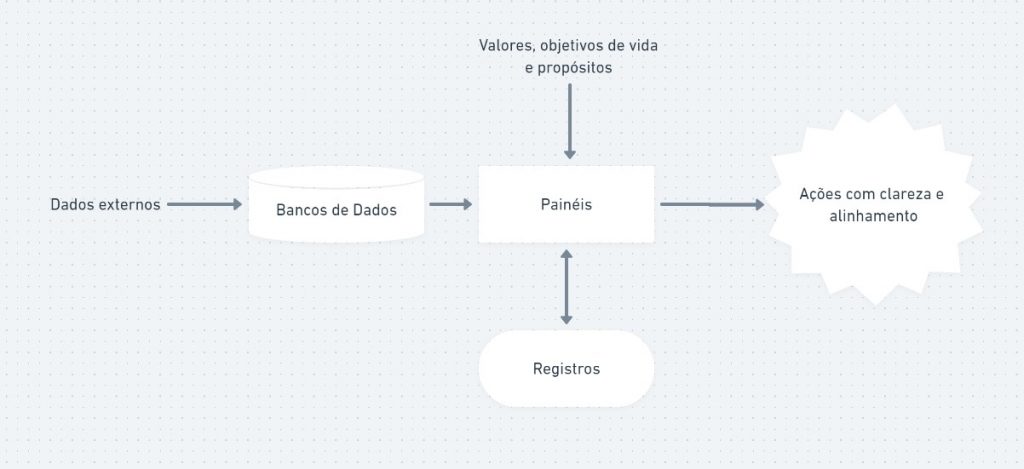Do you think your life is organized? Do you have organized procedures and methods to achieve your goals? Do you know where to find each piece of information, remember everything that needs to be done and can you tell what is a priority each day?
I dare say that this is probably a somewhat distant reality for most people.
After all, organizing life is not a simple task. Each of us has different needs, different life goals and unique areas. Usually the time left to think about organization is short, the tiredness of everyday life is deep and we don't even know where to start.
The result is a life in which stress is constant, disappointment with ourselves comes with every forgetfulness and frustration accompanies the moments we look back and discover that we are walking in a direction that does not lead us to the completion of our dreams and goals.
I understand this well and in this new series here on the Blog and on YouTube I want to help you a little with your organization.
Systems Thinking
Much of the inspiration for the way I organize myself today comes from the need I had to learn to manage my business, from consultancies, studies and other references in the area of “system thinking”.
Before, this type of approach and structuring of life was more possible only for corporations with the purchasing power to acquire complex and expensive systems.
However, today we have at our disposal tools such as Notion, Coda and Airtable, which bring flexibility and powerful features for free.
As one of the references I follow – August Bradley – says, they are like “LEGO blocks to assemble” and so we can organize any information or procedure in our personal life or in our business.
But exactly because they are so flexible and powerful, these tools end up being difficult for the average user. They require a very high level of systems thinking.
The main idea of systems thinking is that things are more complex than we think. In general what we experience in life is the linear relationship of cause -> effect. That is, we take an action to have a goal.
“Studying harder will lead to better grades.”
“Working out will make you lose weight.”
“Looking for work will make an opportunity appear.”
However, the reality is that life is much more complex. Weight loss, for example, does not depend on just one factor. Food, access or purchasing power, sleep, stress, genetic conditions, psychological issues and others are part of the problem solution and only aligned can generate the expected result.
Systems thinking also understands that there are areas we have no control over and areas we can control. This is especially important as it guides us to have a sincere and objective vision to create the appropriate expectations for each situation and also to be able to prioritize what is most important at each moment.
Another example that facilitates the understanding of systems is the car.
Each component of the car – wheels, engine, ignition, doors, etc – by themselves do not define a car. They do not function as a car and they do not achieve a goal that a car achieves, such as getting us from point A to point B. They are systems in themselves and they have a system.
They themselves are systems and have within them even other systems, but only together do they act as the system called ‘car'.
In our life, we have dozens of systems working in parallel and the result we produce professionally, socially or internally is derived from how effective we are in making these systems work together.
A person who does not take care of their body, does not write down their appointments, does not know what to prioritize what is most important, does not study, does not take good care of their children and/or does not work with something that satisfies them probably cannot also look at their interpersonal relationships, their body or the result of their work and say they are satisfied.
We are the result of how well we manage the various areas of our lives.
And a cool term here is“Emergency“.
Emergence is the phenomenon that occurs when the sum of individual parts generates unique properties that each individual part does not possess.
Again, a car only has the result of being able to take us long distances in a short time when all its parts work together.
Water is formed from Hydrogen and Oxygen (H2O) molecules, but these molecules on their own do not have the characteristic “wetness”; this only emerges when two hydrogens and one oxygen work together.
In this way, identifying emergencies is one of the main powers of systems thinking and will enable us to better understand how the sum of the various areas of our lives define us.
More specifically, knowing how to create systems that generate emergencies or results that we desire is the great goal that we should pursue when organizing our lives to succeed in what we want.
Understanding Systems Thinking
To begin to understand the world through systems thinking, we need to understand what goes into the system, what comes out and how the movements within the system are.
What are the entry and exit points? What is the path? What is the speed? Are there blockages? What happens at these blockages?
Next you need to understand which parts of the system are linear and which are circular. In general the main parts of the system are circular, so understanding this will help to identify and prioritize the circular parts as they tend to generate the greatest results.
Next, we have to identify the patterns and recurrences. How the system works as a whole and how actions that recur can improve or worsen the system.
Moving forward, we have to understand what regulates the system. What keeps it balanced and within its limits. These are the elements that keep the system in check and control it so that it does not go astray.
Finally, it is interesting to think about how the system interacts with other systems. Every system ends up having an interaction with another larger system.
Cool… but why all this?
Well, our goal here is to set up a system that comprises the organization of several areas of our lives. Therefore, as we move forward we will also seek to observe all these characteristics in the systems that compose us.
The Notion platform
If you don't know Notion, I wrote a brief analysis of the system in this link, but I will explain below a little too.
Notion is online software that allows you to create pages and databases.
That is, you can create a blank page and add whatever you want there. Texts, images, links, galleries, etc. You can organize these contents in columns and rows to form different layouts.
Now, what really makes this system different and powerful has to do with the databases.
A database is nothing more than a table, like Excel or Google Spreadsheets. You have rows and columns with data that can be organized any way you want.
In Notion, you can create stand-alone databases or even connect multiple databases to create your systems.
For example, if you want to make a page with a text, an image and a database, you can do it:

This flexibility is the biggest benefit we have, and also exactly what makes people give up tinkering with Notion.
After all, without direction on how to get started it's hard to understand what we can really do with it.
That's where this series comes in.
The life organization project
To try to make this life organization a little more concrete, I'll show you more or less what we want to complete.

In this diagram we have the following line of reasoning:
- We collect external data and organize it in databases – Tasks, information we deal with, contacts, our agendas, notes, etc.
- We create dashboards (pages in Notion) to show this data according to what is important to us according to our values, life goals, targets, etc.
- We record our progress and frequently analyze our actions
- We take sure actions on a daily basis towards what we intimately want to do with our lives
As I have already mentioned, some parts of the system I propose come from my own studies, consultancies and tests of what works best and what slows us down more than it helps. However, I recently came across August Bradley's channel, an expert on the subject, and decided to improve even more with the suggestions he passes on his channel.
If you understand English, I highly recommend that you follow along as well.
The inspiration for formatting the system is that we can perform actions every day that will bring us closer to our most important goals.
Therefore, we need to deeply understand our principles, pillars, values, purposes and so on. I have read dozens of personal development books and each of them points to some important element. The goal is to align several of these elements into productive, healthy and inspiring routines.
Habits, for example, are a central part of the system, because what we do every day a little bit is much more important in defining us than what we only do sporadically.
We will determine the habits, follow them and review them within our organization.
To give you an idea of the path we are going to take, look at the sequence of what we need:
- Understand our principles
- Determine the pillars of our life
- Make clear the goals we currently have in the various areas
- Understand how to translate our objectives into metricized and easy-to-follow goals
- Link the projects we deal with in our work and personal life with our goals and pillars
- Organize actions by priority so that every day we go in the right direction
- Understand what information we deal with on a daily basis and how we can digitize and organize it
- Create routines to review our actions
- Set up dashboards to have clarity of the whole system
- Understand how we can always improve
Conclusion
I do not know how many texts and videos this series will have, but little by little I want to share with you this method of organizing life.
I have no relationship with any of the software or individuals I have mentioned or will mention in this series, so my goal is really to share this information and also take advantage of your feedback to further improve my systems.
From my observations, I believe that introspection like this is beneficial for us to be happier, calmer and more excited about what we accomplish on a daily basis.
I hope you enjoy this new series and look forward to hearing from you if you have any questions along the way.
Have fun!

